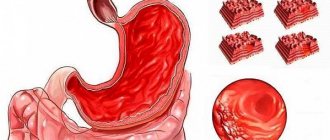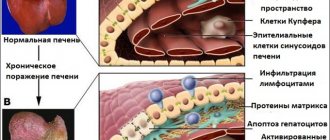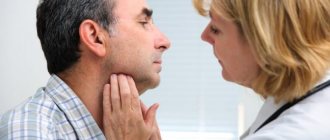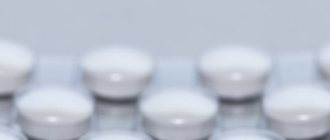We tell you what is actually the most common cause of gastritis of the stomach, what are the symptoms of the disease and what is the modern approach to effective treatment.
ELENA IONOVA
Journalist "KP" EKATERINA ZAGREBINA Candidate of Medical Sciences, gastroenterologist, hepatologist "SM-Clinic"
Diseases of the gastrointestinal tract (GIT) are among the five most common health problems in modern people. And gastritis - inflammation of the mucous membranes of the stomach - is the most common problem with the gastrointestinal tract. Unfortunately, many of us for a long time do not attach due importance to the manifestations of gastritis, “mask” the symptoms by uncontrolled use of drugs and folk remedies. There is also a myth that it is completely impossible to cure gastritis of the stomach; it will definitely return under stress and dietary errors.
Together with experts, we’ll figure out what actually is the most common cause of gastritis, how not to miss the first symptoms of the disease and how to choose a modern, competent treatment regimen.
Digestive processes in the human body
Our stomach is the most vulnerable organ of the digestive system. The most important and complex digestive processes take place in it:
- Mixing of food occurs in the stomach - this is a mechanical process.
- Next, the breakdown of food occurs there - this is a chemical process.
- And absorption of nutrients. If at least one of these processes goes wrong, the entire digestive system suffers, and all further stages of its work are disrupted.
Most often, the inner wall of the stomach is damaged, its mucous membrane, where the production of the most important components of digestion occurs - gastric juice and protective mucus.
Reviews
Galina, mother of five-year-old Dima: My son suffered from food poisoning with acute gastritis, after which he refused to eat and lost weight. I was advised to make dandelion syrup. In the spring we collected flowers together. And it’s very easy to prepare: sprinkle sugar on each layer of flowers, it took 0.5 kg in total, then crush it and let it brew until the juice comes out. Kids love it, try it.
Elena, 45 years old: I always have milk and honey in the refrigerator. If my husband gets tired at work, he complains of stomach pain. Drink it warm and everything goes away.
Larisa, 56 years old: I recently learned about the beneficial properties of safflower oil. I have diabetes, so not everything can be eaten. Indeed, I noticed that the stomach pains disappeared.
Symptoms of gastritis of the stomach
Symptoms of gastritis can worsen due to errors in diet (a lot of fatty, spicy, salty foods), stress (it has been proven that in acute emotional situations the production of gastric juice increases), taking certain medications, severe fatigue, sudden changes in time zones if you travel.
But all these manifestations are a consequence of the fact that the stomach is unhealthy and needs help. The most common symptoms:
- Pain and heaviness in the abdomen.
- Bloating.
- Quick satiety, intolerance to certain types of food.
- So-called “hunger” pains, they occur on an empty stomach or during the day if you have not eaten for a long time.
- Also, with gastritis, pain often occurs soon after eating, especially if you have eaten heavily.
- Feeling of general discomfort in the abdomen throughout the day.
In fact, the most common cause of gastritis is the microbe Helicobacter pylori. The discovery of this microbe and proof of its destructive effect on the human stomach is one of the most important discoveries in medicine of the late twentieth century.
What causes gastritis of the stomach
In 2005, Australian scientists Barry Marshall and Robin Warren received the Nobel Prize in Medicine or Physiology for the discovery of a microbe that causes gastritis of the stomach, as well as for the development of a fundamentally new system for diagnosing and treating this disease.
For the first time, people started talking about the “microbial” theory of gastritis somewhere in the mid-80s of the twentieth century. Marshall and Warren discovered a microorganism in analyzes of the gastric mucosa of patients with gastritis and named it Helicobacter pylori. Nobody believed the scientists back then: it was believed that the hydrochloric acid released in the stomach kills all living things, including any bacteria.
Colleagues laughed at Marshall even when he accomplished a professional feat: he grew Helicobacter in a test tube, drank and... two weeks later he fell ill with gastritis!
Helicobacter pylori is a bacterium that damages various areas of the stomach and duodenum. Many cases of gastritis are associated with contamination of the mucous membranes by Helicobacter.
It was only recently that reliable evidence of the theory was obtained. It turned out that insidious bacteria do not die in the stomach because they secrete a special enzyme - urease, which neutralizes hydrochloric acid.
In 2015, the medical journal Attending Physician published a large-scale study conducted in Germany by several medical centers and laboratories in Berlin and Hannover. The authors of the study said, in particular, the following: Helicobacter is transmitted through hands, saliva, dishes, kissing, etc. The microbe can enter our body with contaminated food and water. Then it settles on the gastric mucosa and multiplies, forming microbial colonies. And it begins to corrode the mucous membrane - this is how foci of inflammation appear, which lead to gastritis of the stomach. The authors of the German study write: “Infection with Helicobacter pylori can lead to an inflammatory response, increased gastric acid volume and gastritis.”
Diagnostics
Stages of diagnosing chronic gastritis:
- Endoscopic diagnosis with mandatory biopsy - the presence of Helicobacter pylori, the nature and localization of changes in the gastric mucosa, the presence of precancerous changes in the gastric mucosa are clarified. For a biopsy, at least 5 fragments are taken (2 from the antrum, 2 from the body of the stomach, 1 from the angle of the stomach).
- Clinical diagnosis - the patient’s complaints, anamnesis, examination data of the patient are analyzed, a presumptive diagnosis is made and a rational plan for instrumental examination is drawn up.
- Laboratory diagnostics - clinical blood test, biochemical blood test, clinical urine test, clinical stool test, stool occult blood test, detection of Helicobacter pylori infection.
- Respiratory diagnostics - the presence of Helicobacter pylori is specified. This method involves the patient taking urea of normal isotopic composition and then measuring the ammonia concentration using a gas analyzer.
- Intragastric pH-metry - determination of the state of secretion and diagnosis of functional disorders in acid-related gastrointestinal diseases.
- Ultrasound examination of the liver, pancreas, gall bladder - to identify concomitant diseases of the gastrointestinal tract.
- Manometry of the upper gastrointestinal tract, with the help of which the presence or absence of reflux gastritis is determined (normally in the duodenum the pressure is 80-130 mm water column, in patients with reflux gastritis it is increased to 200-240 mm water column .).
- Electrogastroenterography is a study of the motor-evacuation function of the gastrointestinal tract in order to determine duodenogastric reflux.
Establishing a clinical diagnosis is based on determining the type of chronic gastritis, assessing the prevalence of morphological signs of the disease, the presence and severity of gastric dysfunction.
Treatment of gastritis of the stomach
In September 2015, the so-called Kyoto consensus was published, which defines the gold standard of gastroenterology.
It states that in the treatment of gastritis, eradication is recommended, that is, the elimination of the bacterium Helicobacter pylori. Without this, treatment may be ineffective, and there is a high risk that the symptoms of gastritis will return again and again. Since Helicobacter is a bacterium, the treatment regimen for gastritis includes antibiotic therapy. But this is not a panacea. Here's what Russian experts say: “The widespread use of antibiotics to eliminate Helicobacter is associated with significant problems. Among them is a decrease in the effectiveness of treatment due to resistance (addiction) to antibiotics. The Kyoto Consensus noted concerns about this, in particular, an increase in allergies or obesity, a violation of the composition of the intestinal microbiota (microflora)” (data from the Central Research Institute of Geology, State Budgetary Institution of Healthcare, Moscow Scientific Research Center, Moscow Healthcare Center, published in the journal “Attending Physician” in 2021).
On average, more than 70% of adult Russians experience symptoms of gastritis. For some, these are episodic manifestations that are “extinguished” by painkillers and enveloping drugs, for others, gastritis becomes chronic and makes itself felt with any errors in nutrition or stress. It is important that in most cases, gastritis is caused by the proliferation of the bacterium Helicobacter pylori on the gastric mucosa.
Ready-made herbal preparations
For those patients with stomach problems who want, but do not have the opportunity to prepare drugs according to traditional recipes, we can recommend purchasing ready-made dosage forms at the pharmacy:
- Plantaglucide in infusion or granules - from plantain;
- Romazulon – from chamomile flowers;
- Rotokan - a combination of chamomile flowers, calendula, yarrow herb;
- Iberogast - alcohol extract of the best herbal remedies (chamomile, bitter Iberian, celandine, licorice root, caraway, milk thistle, lemon balm, mint);
- Caleflon - from calendula flowers.
There are many recommendations for preparing gastric preparations and combinations. Everyone can choose the most suitable remedy.
Innovation
Scientists have begun searching for substances that are less traumatic for the body and effective in combating Helicobacter.
And in the course of numerous studies, it turned out that a pronounced positive effect is observed when taking certain beneficial bacteria. Among the numerous beneficial bacteria that have a positive effect on the microflora of the stomach and intestines, there are those that also fight “bad” bacteria, in particular Helicobacter. They have also been shown to increase the effectiveness of drug therapy in the treatment of gastritis and reduce the side effects of taking antibiotics.
The search for truly effective and safe remedies against Helicobacter took many years.
Diet for gastritis of the stomach
Of course, to achieve a positive effect in the treatment of gastritis, you need to adjust your diet. This does not mean that now you will have to eat only pureed soups, mashed porridges and wash it down with rice water for the rest of your life. But you need to adhere to certain restrictions: in case of inflammation of the gastric mucosa, you must temporarily exclude spicy, fried in oil, salty foods, fermented products (kvass, beer, black bread), foods with added vinegar, strong broths, mushrooms, carbonated drinks. In the acute stage of gastritis, you should also not lean on fresh vegetables and fruits, they increase fermentation. Vegetables are best eaten stewed or boiled. White, dried bread is preferable. You will have to give up any alcohol during treatment.
Don't overeat. It’s better for your stomach if you eat small meals (5-6 times a day every 3-4 hours).
The use of alcohol-containing tinctures
Extracts of beneficial substances are not always well released by boiled water. Therefore, some tinctures are prepared by aging for 10–14 days in vodka or 70-degree alcohol. Their use always requires additional dissolution in milk or water. Contraindicated for children, pregnant women, and people being treated for alcoholism.
In the pharmacy chain you can buy tinctures of propolis, Japanese Sophora, and aloe. It is recommended to take 10–15 drops three times a day. You can make your own tincture from aloe and Kalanchoe. To do this, do not forget the following:
- a week before cutting the leaves, the plant is removed from the light;
- Fleshy leaves that are at least three years old are used;
- After cutting and washing, they are placed in the refrigerator for 3 days.
Kalanchoe juice is obtained by pressing
Add 500 ml of vodka to 100 ml and leave for 45 days. It is recommended to take a tablespoon on an empty stomach with the addition of honey.
This is interesting
It should be noted that Helicobacter pylori is one of the most common human infections; residents of megacities are more likely to suffer.
According to Russian scientists, the prevalence of this infection in Moscow is 60.7 - 88%, in St. Petersburg - 63.6%, in the cities of Eastern Siberia - up to 90% (data from the TsNIIG GBUZ MKNTs DZM published in the journal "Treating Doctor" in 2021). The less processed and the simpler the product is prepared, the healthier it is for the stomach. Boiled or baked meat is healthier for the stomach than sausages and frankfurters.
Drink water 30-40 minutes before meals (a glass of warm water drunk before meals normalizes stomach acidity). At the same time, do not drink during meals or immediately after it, but at least after half an hour or an hour.
Chew your food thoroughly. If food enters the stomach in large pieces, this creates additional stress, causing discomfort and bloating.
In the evening, try to eat at least three hours before bedtime, and preferably four. Don't sleep after a big lunch.
Don't get used to enduring pain and discomfort. If you begin to “feel” your stomach, immediately consult a gastroenterologist.
Numerous studies show that the main problem in the development of gastritis of the stomach is damage to the mucous membranes by the bacterium Helicobacter pylori. And eliminating contamination with this bacterium is the gold standard of gastroenterology today. It is clear that no diet in the world can get rid of Helicobacter. This requires complex therapy.
How is Gastropanel performed?
Blood sampling to determine markers of atrophic gastritis is carried out in the morning on an empty stomach and 20 minutes after a protein breakfast. Blood is collected into serum tubes, which are centrifuged for analysis.
Blood serum analysis determines markers of chronic atrophic gastritis. Markers of atrophy of the mucous membrane of the fundic and antral parts of the stomach are:
- Pepsinogen I, Pepsinogen II and their ratio,
- Gastrin-17 and Gastrin-17 stimulated after a protein breakfast,
- determination of antibodies to Helicobacter pylori Ig G.
The tests are based on enzyme immunoassay technology.
Besides,
- Antibodies to parietal cells of the body of the stomach are determined in autoimmune atrophic gastritis with a high risk of disorders associated with vitamin B12 deficiency, for which the level of vitamin B12 is determined.
- Homocysteine is identified as a risk factor for vascular and thromboembolic diseases.
- To clarify Helicobacter pylori infection, an additional test of the acute phase of infection is performed, Ig A and IgM antibodies are determined.










